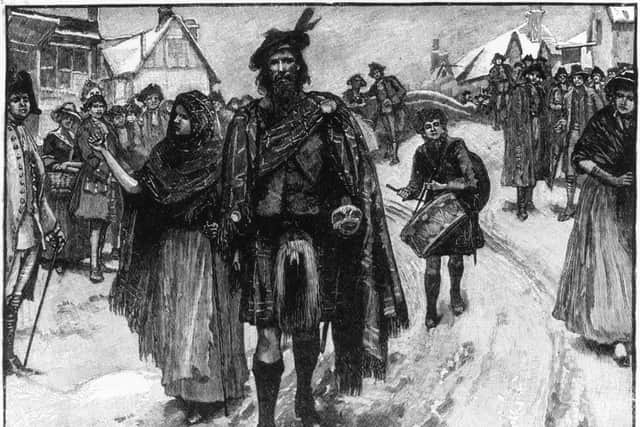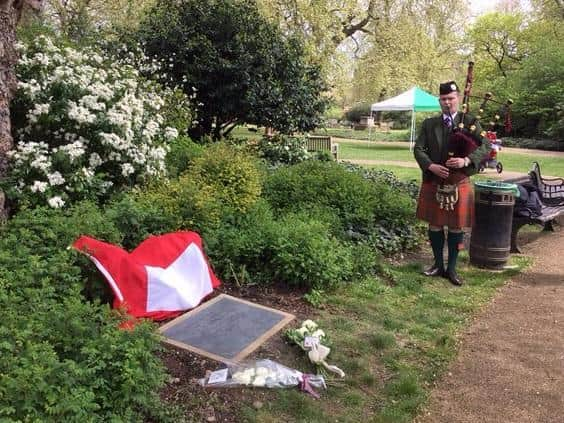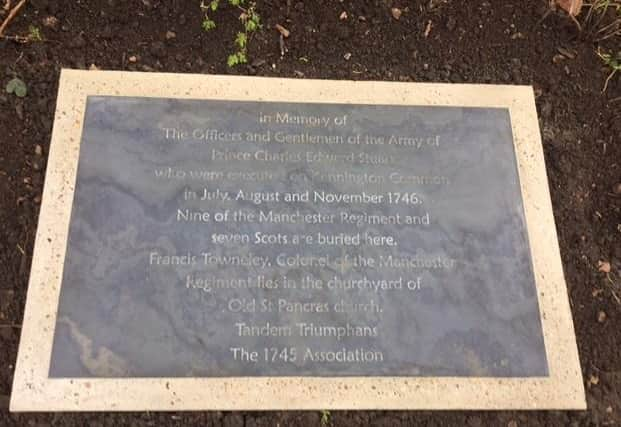Forgotten Lancashire men who died for Bonnie Prince Charlie
and live on Freeview channel 276
April 16 marked the 275th anniversary of the last battle fought on British soil. As in previous years, wreaths were laid at the Culloden Memorial to remember those on both sides who fell on that fateful day.
Yet the regiment which suffered more than any other during the Rising of 1745 was not remembered. For the Manchester Regiment did not serve at Culloden.
Advertisement
Hide AdAdvertisement
Hide AdIt had surrendered to the Duke of Cumberland’s Redcoats at Carlisle 100 days before, and at the time of the battle its officers and men were awaiting their fate at King George’s pleasure.
The regiment was raised during the Jacobite advance through Lancashire, including 40 men recruited by John Daniel at Preston on November 26, 1745.
On the afternoon of November 28, Sergeant Dickson, of the Duke of Perth’s Regiment, marching ahead of the main army, crossed the Irwell from Salford and entered the Bull’s Head Inn at Manchester’s Market Place.
There, it is reported the sergeant, along with a drummer boy and a young lady by the name of Peggy, who had hooked up with the Jacobite Army at Preston two days earlier, sat down for a hearty dinner, and then, suitably refreshed, went out on to the Deansgate to call for recruits to Bonnie Prince Charlie’s Army.
Advertisement
Hide AdAdvertisement
Hide AdWhether drawn by the beat of the drum, Preston Peggy’s dulcet tones – she is reported to have had a fine singing voice – or the sergeant’s rousing call to arms, within a short time quite a crowd had gathered. Initially, the crowd seemed friendly, until the truth dawned that Prince Charlie’s recruiting sergeant had absolutely no back-up, and several hostile Hanoverian heavies appeared on the scene.


By now, Sgt Dickson must have wondered whether he had been entirely wise to enter the town so far ahead of the rest of the army. Happily for him, this particular Manchester derby of Hanoverians vs Jacobites ended with a narrow Jacobite victory.
Enough supporters arrived to prevent the sergeant and his two companions from being lynched. So when Lord Pitsligo’s cavalry at the vanguard of the Jacobite Army rode into town well after nightfall, they were astonished to discover Manchester had already been claimed for King James by a sergeant, his girlfriend and a drummer boy.
King James’s formal proclamation occurred the following day when his son Prince Charlie entered Manchester “midst loud acclamations and ringing of bells”. With the help of Sgt Dickson’s recruits, a regiment was formed, which mustered in the precincts of the Collegiate Church, today Manchester Cathedral on Victoria Street, on November 30 – St Andrew’s Day.
Advertisement
Hide AdAdvertisement
Hide AdFrancis Towneley, scion of an old Lancastrian family born and brought up in Towneley Hall, Burnley, was appointed regimental colonel. He and the regiment’s other officers did not take any pay for their services and, remarkably, paid their men entirely from their own funds. Money was not their motivation. The words emblazoned on the Manchester Regiment’s standard declared they fought for ‘Church and Country’ and ‘Liberty and Prosperity’.


The Manchesters marched to Derby with the rest of the army. They turned back after the fateful Council of War there on December 5 when the clan chieftains overruled Prince Charlie’s desperate entreaty to continue advancing on to London.
At Col Towneley’s request, made he said in the name of all his officers, the regiment remained in England to defend Carlisle Castle when the main body of the army returned to Scotland. It proved to be a hopeless mission.
Carlisle Castle surrendered to the Duke of Cumberland on December 30, 1745. At his trial for treason, Col Towneley claimed Cumberland had broken his word after offering parole, as the Jacobites had to those who surrendered to them earlier in the campaign. Instead, after what can only be described as show trials, he, his fellow officers and his sergeants were condemned to death, while the men of the regiment were transported to the West Indies.
Advertisement
Hide AdAdvertisement
Hide AdTowneley and his fellow Lancastrian Jacobites made a mistake in signing up to Prince Charlie’s Jacobite Army. Yet the retribution they suffered was out of all proportion to the offences committed. They had served for only a month. They never engaged in battle. Indeed, it is unclear whether they ever fired a shot in anger, as contemporary reports suggest the cannons at Carlisle Castle were manned by the Scottish and Irish regulars in the Jacobite garrison, rather than the untrained Manchesters. Yet they were “hanged by the neck, not till they were dead, but cut down alive, their bowels taken out and burnt before their faces, and their bodies severally divided into four quarters.”


Today, execution by hanging, drawing and quartering would be deemed a cruel and unusual punishment, a war crime under international law. Even in 1746, it shocked many of the government’s most loyal supporters.
The victims’ posthumous desecration, when their severed heads were placed on spikes for public display – most in London, but three, Thomas Chadwick, Thomas Deacon and Thomas Syddall, at Manchester’s Royal Exchange – was a vindictive act perpetrated as a stark warning to any others who might be tempted to revolt against the Hanoverian Government’s venal rule. Today, the fact that the regiment which suffered most for its part in the Rising of 1745 was English and not Scottish does not sit well with every political narrative. Yet simply because a truth is inconvenient, it should not be suppressed.
In 2015, The 1745 Association erected a plaque remembering the men of the Manchester Regiment in St George’s Gardens, London, where the last mortal remains of many of them are interred. Later this year, at noon on July 31, to mark the 275th anniversary of the execution of Francis Towneley, Thomas Chadwick, Thomas Deacon and Thomas Syddall on Kennington
Advertisement
Hide AdAdvertisement
Hide AdCommon, a small group will gather at St George’s Gardens, a brief commemoration held in their honour, and a pibroch played to their memory.
The sergeants and officers of the Manchester Regiment executed on Kennington Common in 1746 for their part in the Rising of 1745 were: Sergeants Michael Brady, William Dempsey, John Ellis, Valentine Holt, Philip Hunt, Thomas Park, John Rowbotham and Andrew Swan; Lieutenants John Berwick, Thomas Chadwick and Thomas Deacon; Adjutant Thomas Syddall; Captains Andrew Blood, James Bradshaw, James Dawson, George Fletcher and David Morgan; and Colonel Francis Towneley. The Regiment’s Chaplain, the Rev. Thomas Coppack, was also executed, as was Sgt Thomas Dickson of the Duke of Perth’s Regiment.
Michael Nevin has been chair of The 1745 Association since 2016 and is author of Reminiscences of a Jacobite: The Untold Story of the Rising of 1745, introduced on YouTube at www.youtube.com/watch?v=zZorG7QuLT8
Comment Guidelines
National World encourages reader discussion on our stories. User feedback, insights and back-and-forth exchanges add a rich layer of context to reporting. Please review our Community Guidelines before commenting.